47% of Employees Satisfied with Post-COVID Workstyles; Key Factor is Flexibility in Work Hours and Places
en world Japan, a leading Japanese recruiting firm specializing in global human resources, today announced it partnered with the American Chamber of Commerce in Japan (ACCJ) to survey companies and employees working for foreign-affiliated and Japanese multinationals on their post-COVID workstyle.
Survey Results Summary
- 47% of all employees are satisfied with their current workstyle
- 63% of employees satisfied with their current workstyle responded that their post-COVID workstyle is “the same or more flexible than during COVID”
- 48% of employees at Japanese-headquartered companies who are dissatisfied with their current workstyle are required to work from the office
- 79% of all employees satisfied with their workstyle have a flex system in their company policies
- About half of the employees dissatisfied with their workstyle responded that their company’s turnover rate went up post-COVID
Data Analysis and Commentary
1. 47% of all employees are satisfied with their current workstyle
47% of all respondents answered they were “extremely satisfied” or “satisfied” with their current workstyle (based on work location and hours). 26% of respondents were “neither satisfied nor dissatisfied.” This rate is the same for both “dissatisfied” and “extremely dissatisfied.”
■Differences between employees of foreign-affiliated companies and Japanese-headquartered companies:
53% of employees at foreign-affiliated companies answered they were “extremely satisfied” or “satisfied” with their current workstyle, 11 points higher than the 42% at Japanese-headquartered companies. Employees who answered “dissatisfied” or “extremely dissatisfied” were 23% at foreign-affiliated companies and 31% at Japanese-headquartered ones. Figure 1
■Differences in age group:
The results by age group for both foreign-affiliated and Japanese-headquartered company employees showed significant differences among the 25–29, 40–49, and 60+ age groups.
• For employees in the 25-29 age group, 56% of foreign-affiliated employees responded they were “satisfied,” compared to the 9% among Japanese-headquartered employees, a difference of more than 47 points.
• In the 40–49 age group, there was a 14-point difference between foreign-affiliated and Japanese-headquartered employees in the total of “extremely satisfied” and “satisfied.”
• In the 60+ age group, 0% of foreign-affiliated employees were “dissatisfied” or “extremely dissatisfied,” while 20% of Japanese-headquartered employees were “dissatisfied.” Figure 2 Figure3
Q1: Overall, how satisfied are you with your current workstyle (where and when)?
Figure 1
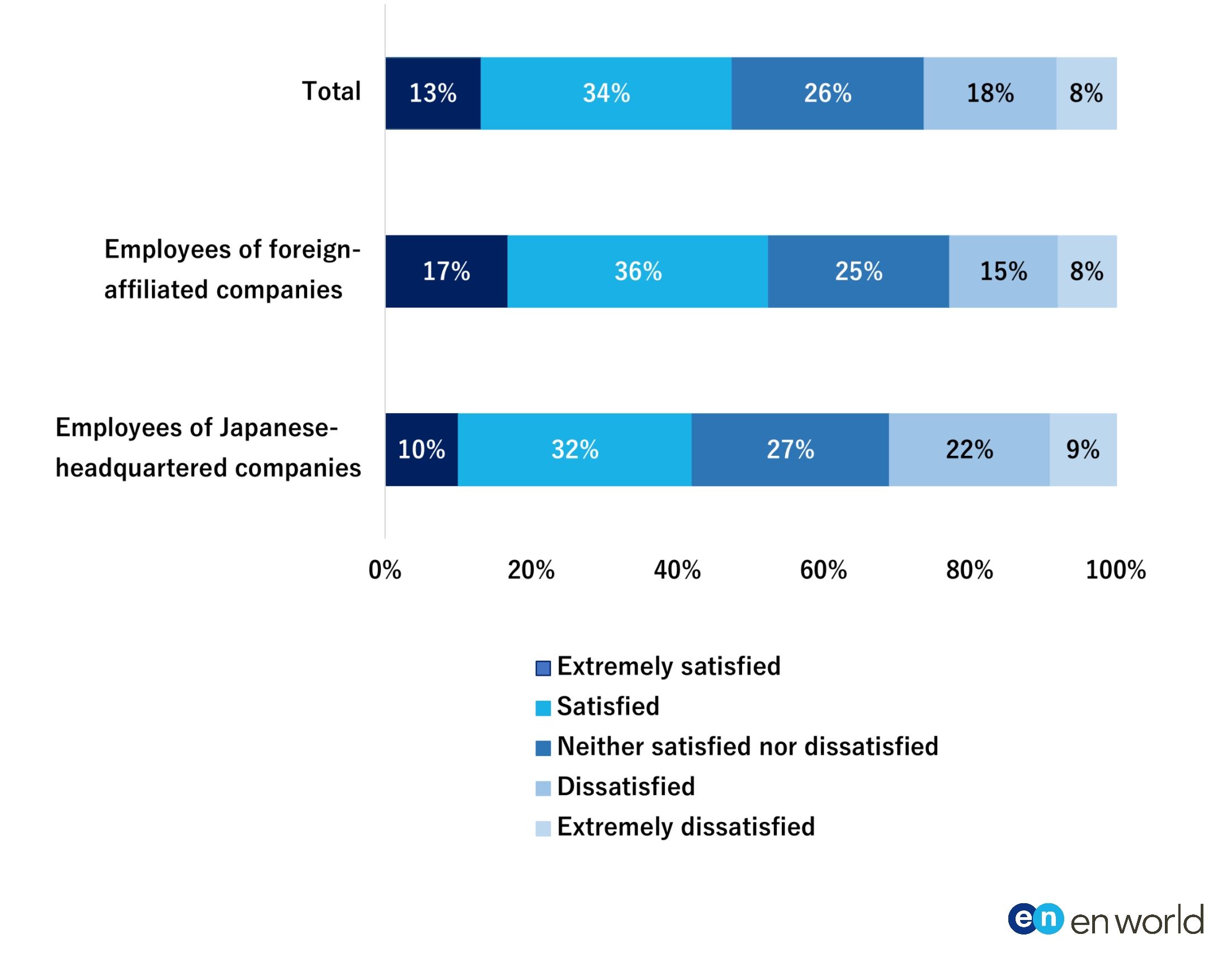
Figure 2: Responses from foreign-affiliated employees by age group
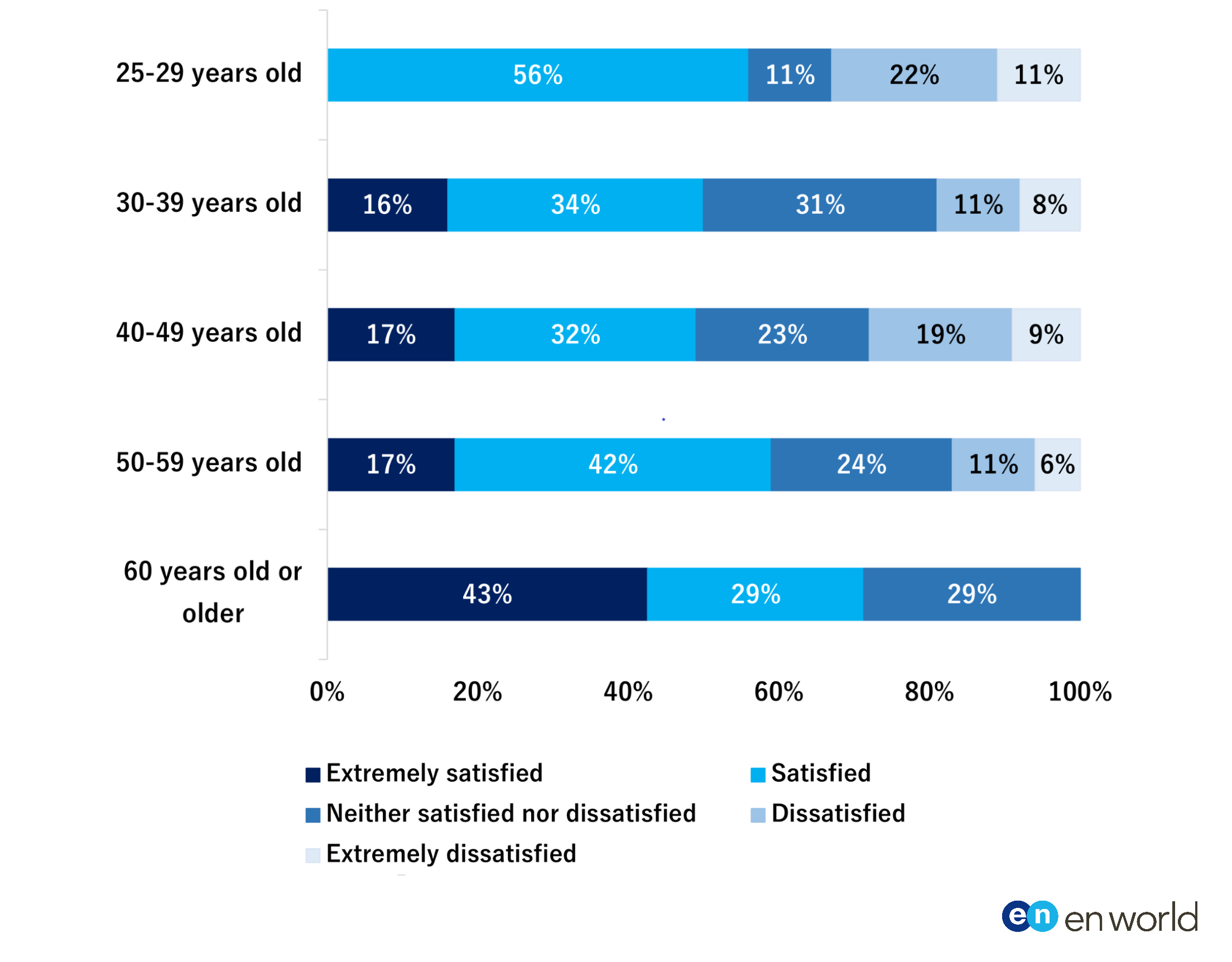
Figure 3: Responses from Japanese-headquartered employees by age group
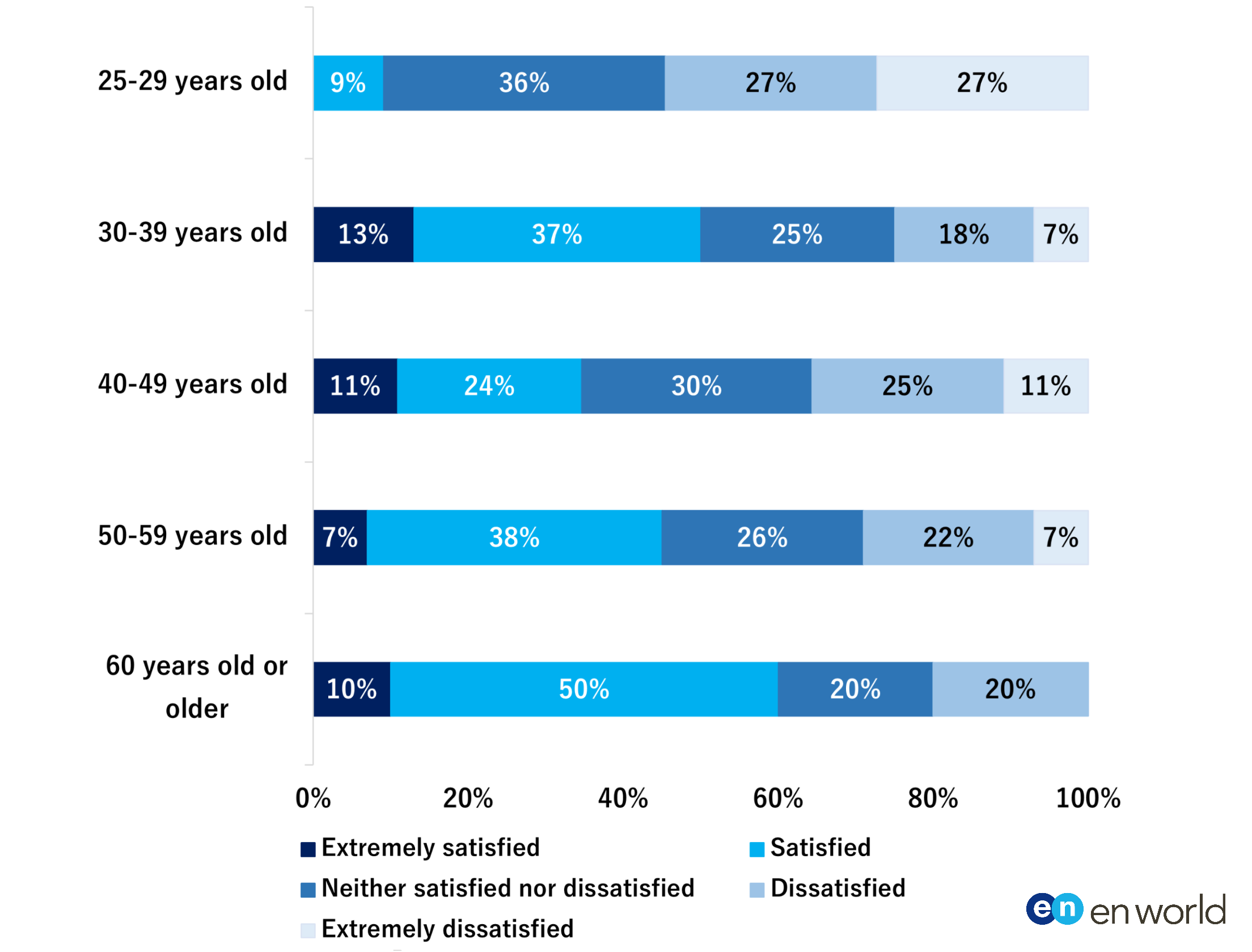
*One person each among employees of foreign-affiliated and Japanese-headquartered companies responded, “I do not wish to answer”
2. 63% of employees satisfied with their current workstyle responded that their post-COVID workstyle is “the same or more flexible than during COVID”
Among those who answered “extremely satisfied” or “satisfied” with their current working style, the highest percentage (63%) said their working style was currently “the same or more flexible than during COVID.”
On the other hand, the highest percentage (58%) of employees “dissatisfied” or “extremely dissatisfied” with their current workstyle responded that it became “less flexible” than during COVID. Figure 4
Figure 4 Q2: With COVID restrictions lifted, my company's workstyle policy is:
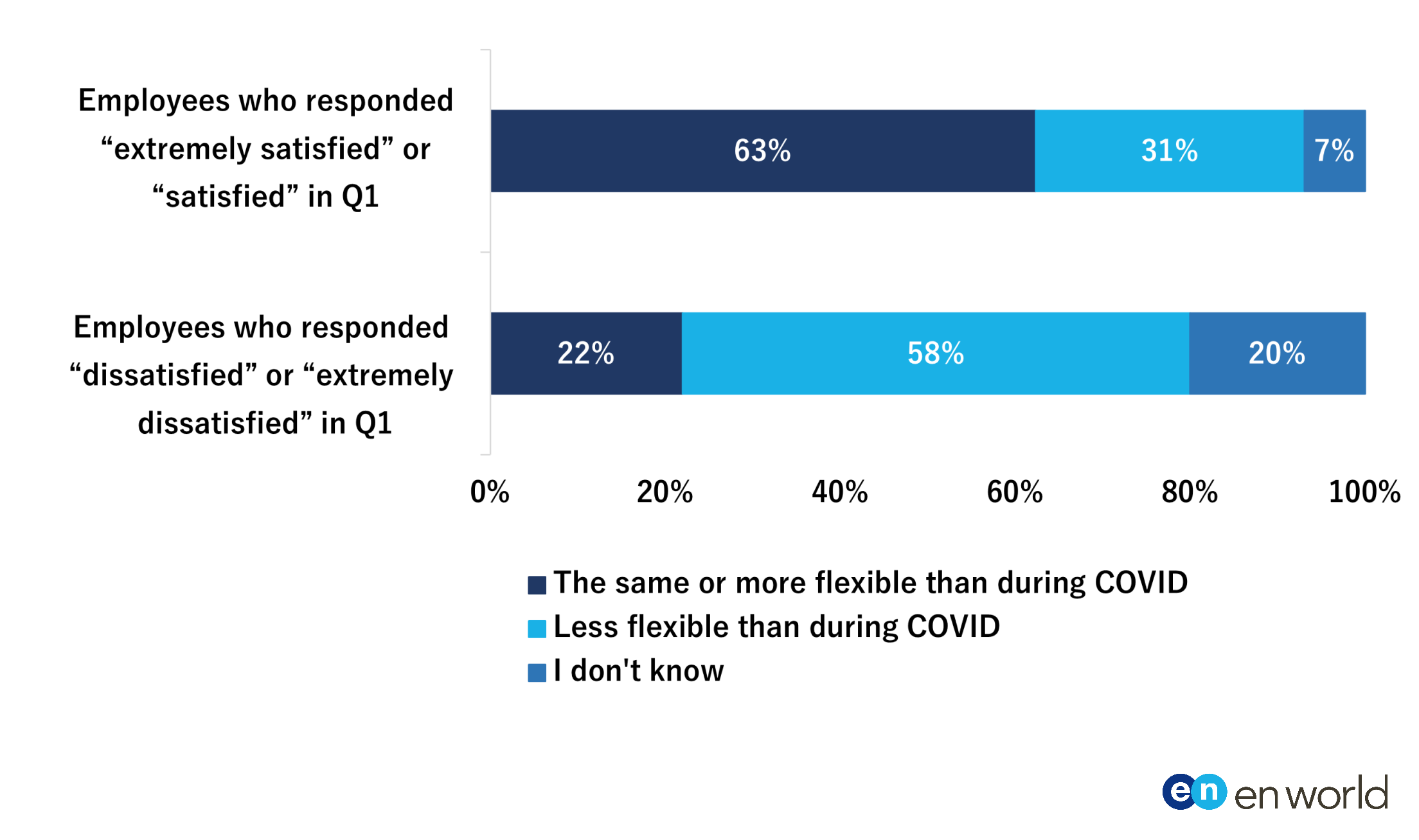
3. 48% of employees at Japanese-headquartered companies who are dissatisfied with their current workstyle are required to work from the office
Employees who answered they were “dissatisfied” or “extremely dissatisfied” with their current workstyle were then asked about their company’s current remote work policy, yielding differences between foreign-affiliated and Japanese-headquartered companies.
The largest percentage of Japanese-headquartered employees (48%) had only the option of “always in-office,” 37 points higher than for foreign-affiliated employees. On the other hand, the largest percentage of foreign-affiliated employees (49%) chose “1-2 days remote” per week, a difference of 28 points from the Japanese-headquartered employees. Figure 5
The next question asked about employee desire for remote work among those who were “dissatisfied” or “extremely dissatisfied” with their current workstyle. None of the foreign-affiliated employees chose to be “always in-office,” while just 7% of Japanese-headquartered employees did. Very few respondents overall selected “always in-office” work. Figure 6
Q3: What is your company’s current policy for remote work?
Figure 5: Responses from employees who responded “dissatisfied” or “extremely dissatisfied” in Q1
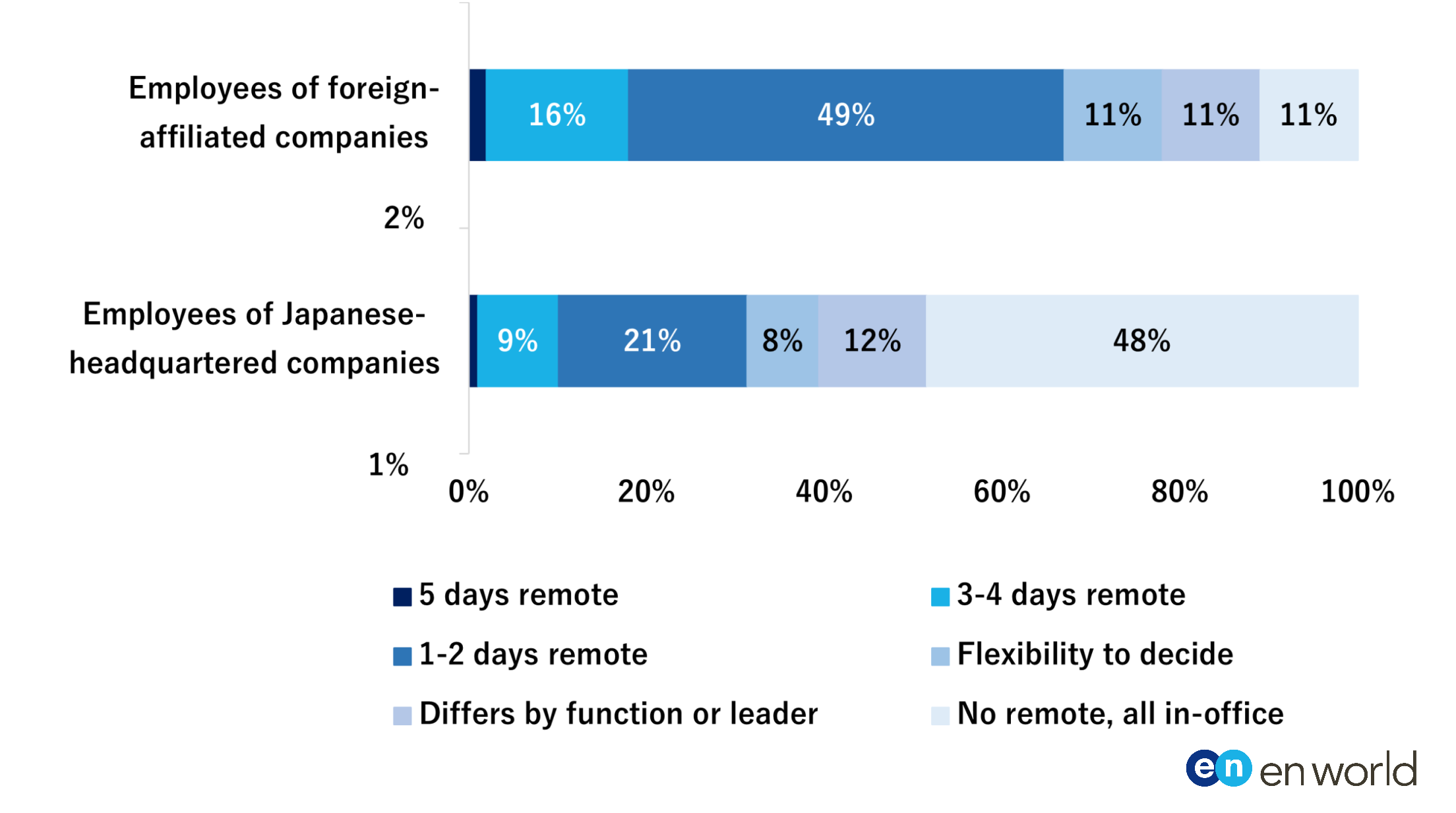
Q4: What is your desire for remote work?
Figure 6: Responses from employees who responded “dissatisfied” or “extremely dissatisfied” in Q1
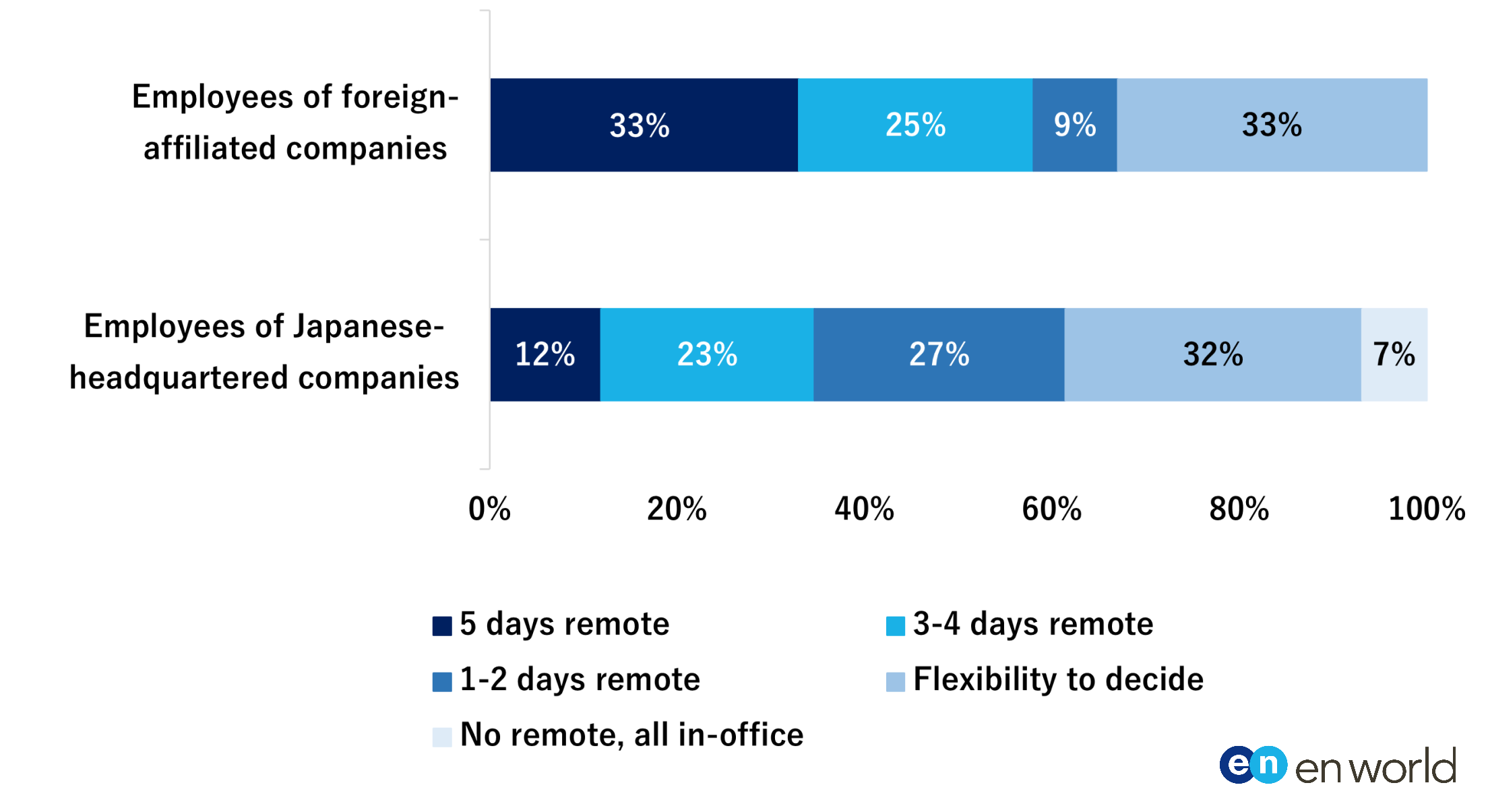
4. 79% of employees satisfied with their workstyle have a flex system in their company policies
Many employees who answered “extremely satisfied” or “satisfied” with their current working hours were from companies that have adopted flexible working hours systems, regardless of whether they are foreign-affiliated or Japanese-headquartered. Figure 7.
Among those who are “dissatisfied” or “extremely dissatisfied” with their current work style, the largest percentage (56%) of Japanese-headquartered employees responded that their companies have “fixed start and end times” while this rate was the second most (36%) at foreign-affiliated companies. Figure 8
Q5: What is your company’s current policy for when to work (flex time systems)?
Figure 7: Responses from employees who responded “extremely satisfied” or “satisfied” in Q1
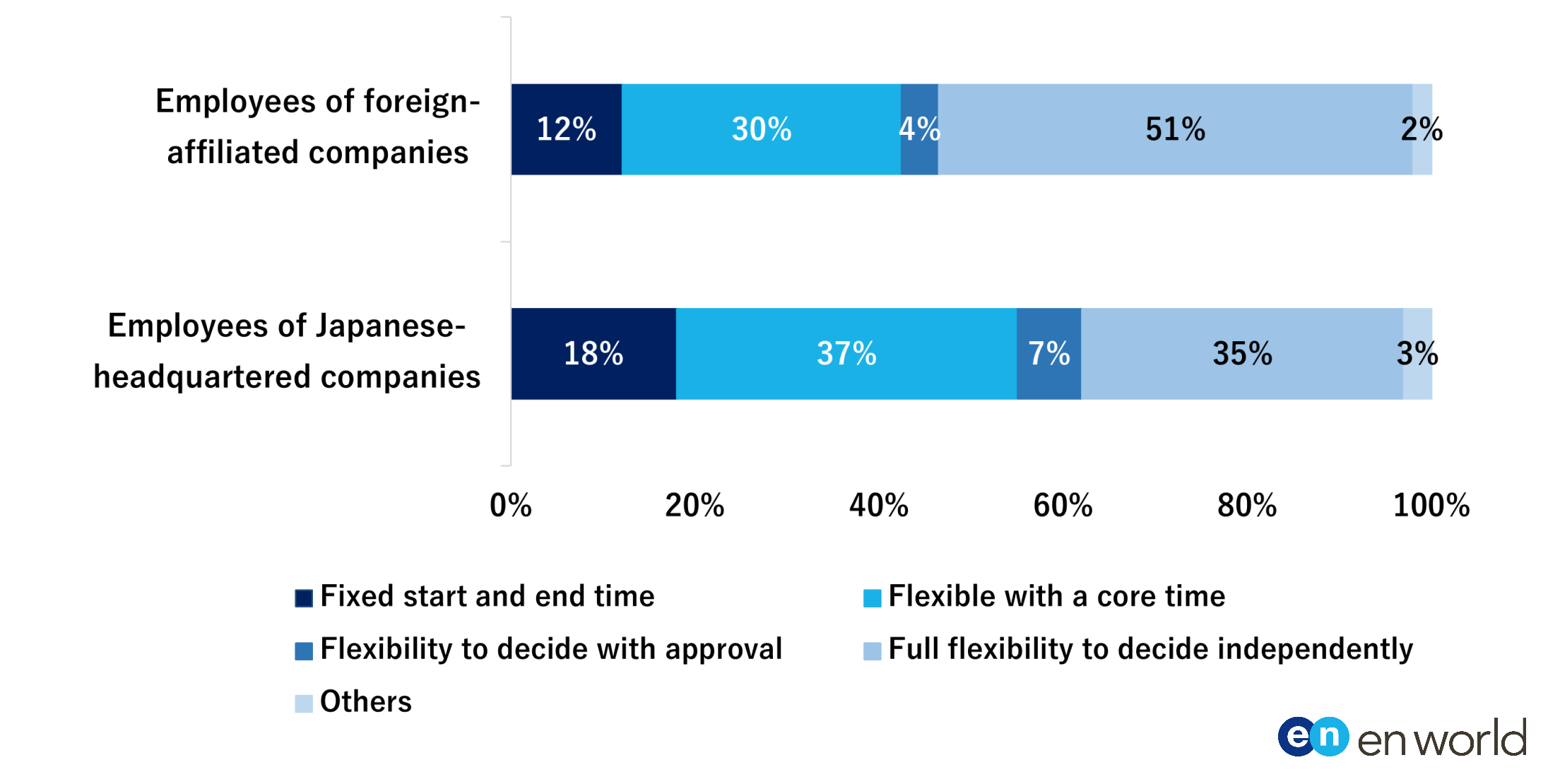
Figure 8: Responses from employees who responded “dissatisfied” or “extremely dissatisfied” in Q1
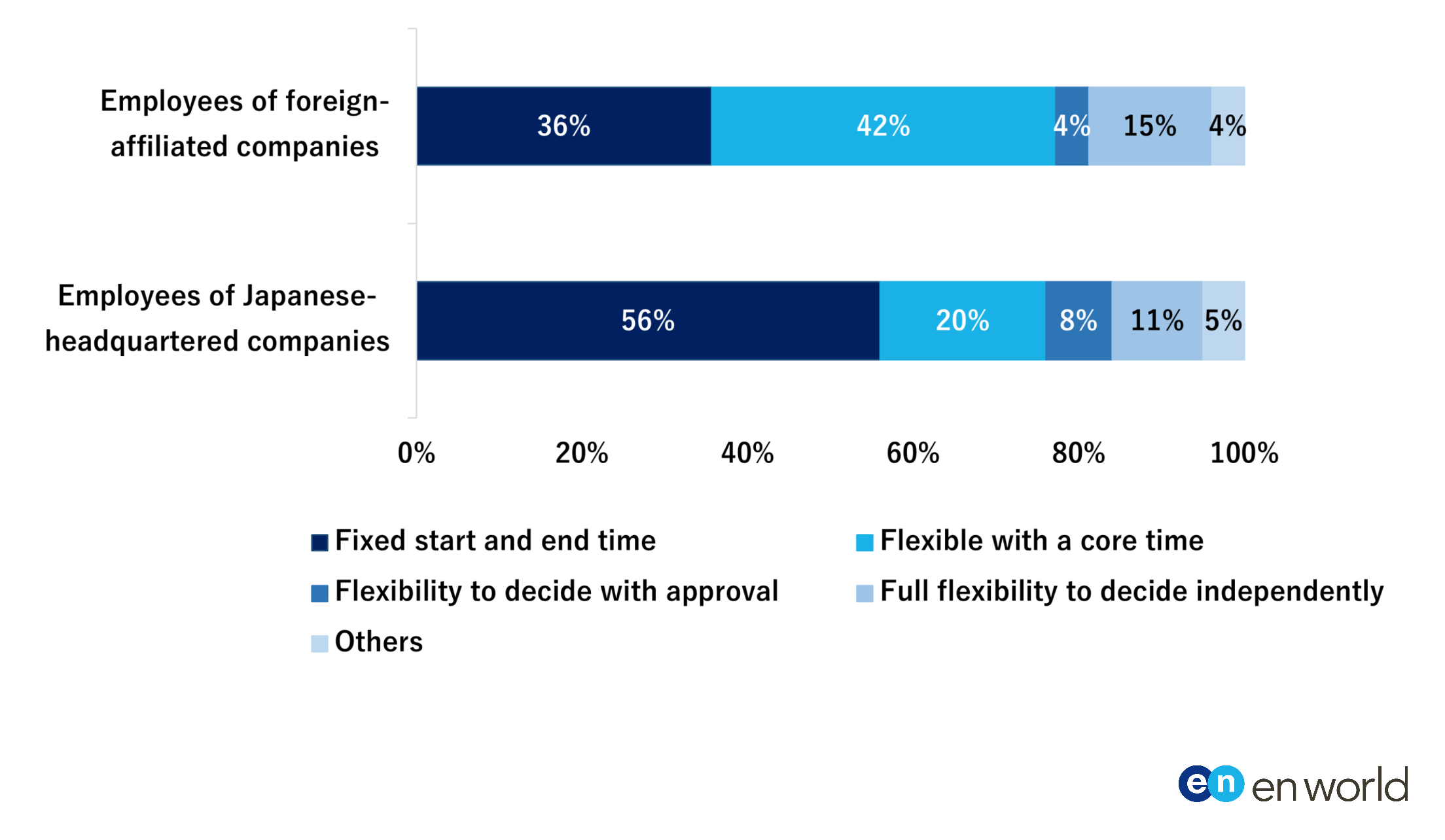
5. About half of the employees dissatisfied with their workstyle responded that their company’s turnover rate went up post-COVID
One question asked what kind of changes companies have experienced in terms of “work efficiency,” “engagement (sense of belonging and spirit of loyalty to the company),” “ability to balance responsibilities outside work,” and “staff turnover” since the COVID restrictions were lifted.
The most common response from employees who answered “extremely satisfied” or “satisfied” with their current workstyle was “stayed the same” for all factors.
On the other hand, the highest rate of employees who answered “dissatisfied” or “extremely dissatisfied” with their current workstyle felt that their “ability to balance responsibilities outside work” had “decreased” (46%). They also had the most responses (48%) for an “increase” in “staff turnover.” Figure 9, Figure 10
Q6: What changes within the company have you observed since COVID restrictions were lifted?
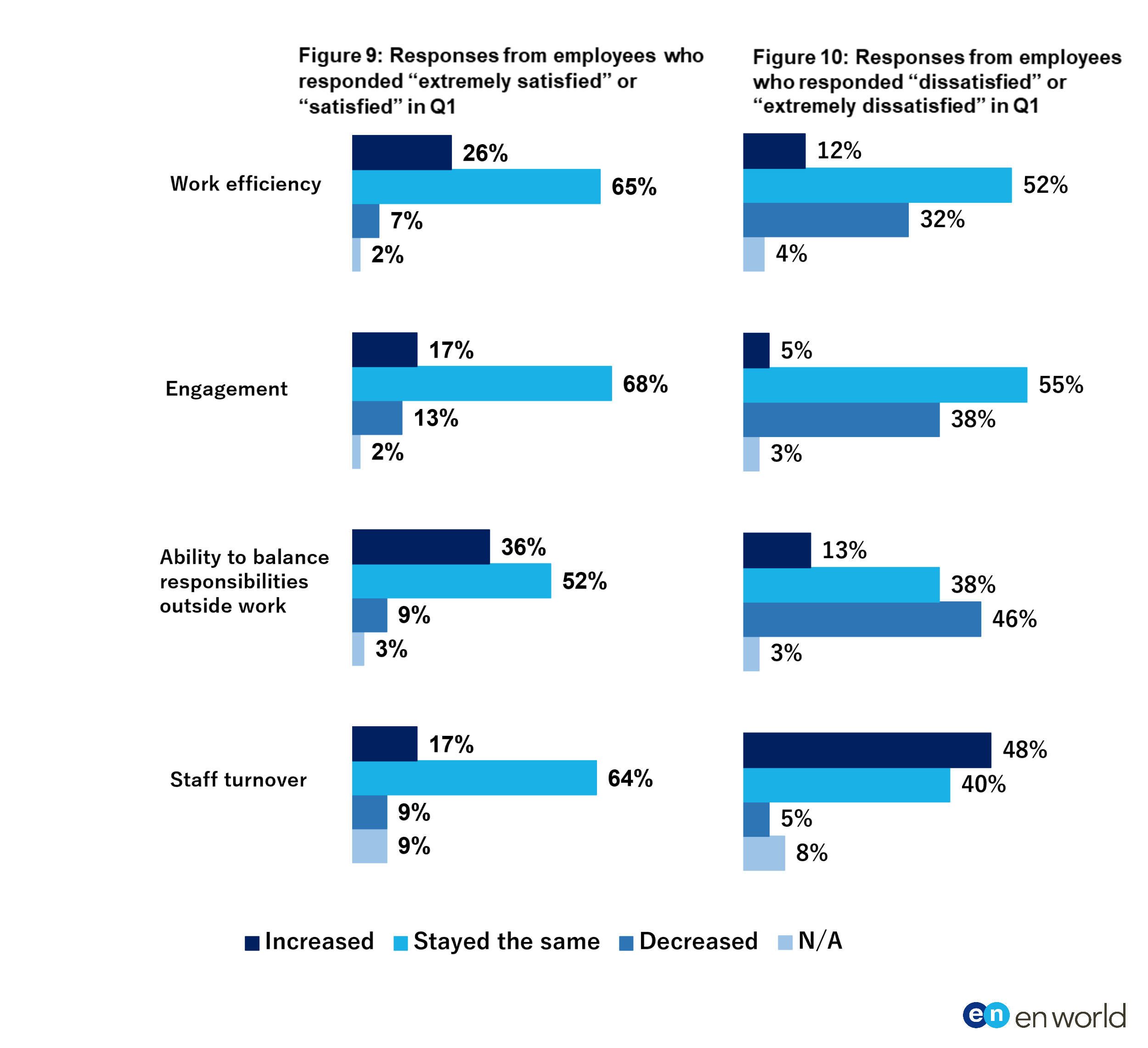
▼Download PDF
Survey on Post-COVID Workstyle_20240709
Survey Overview
Survey method: Internet survey
Surveyed regions: Nationwide in Japan
Survey period: September 25–October 6, 2023
Number of respondents: 483
Respondents’ company affiliation: 51% foreign-affiliated company employees, 49% Japanese-headquartered company employees (aged 25+)
Response format: Single and multiple responses
-----------------------------------------------------------------------------
About en world Japan
en world Japan is a recruiting firm specializing in global human resources. Our expertise is in recruitment and job placement support for middle to high-level positions at foreign and Japanese multinational companies. We provide a full range of recruitment and job placement support services through permanent placement, executive search, professional staffing, and Recruiting Process Outsourcing (RPO).
Press Contacts
PR & Communications, en world Japan
Email : enworld-pr@enworld.com
